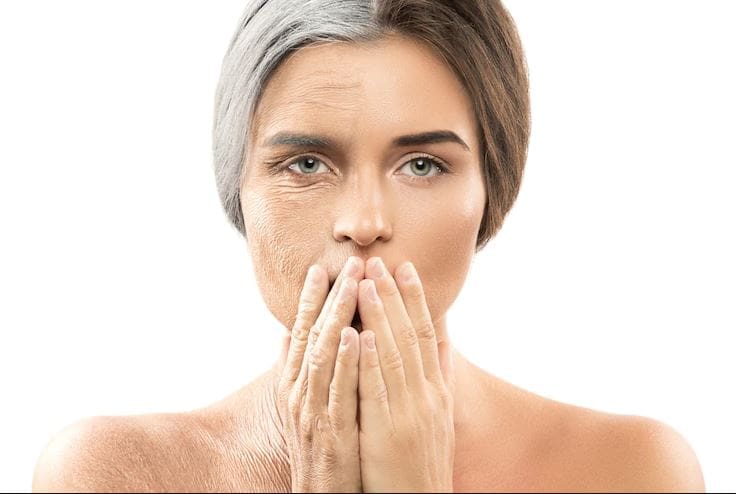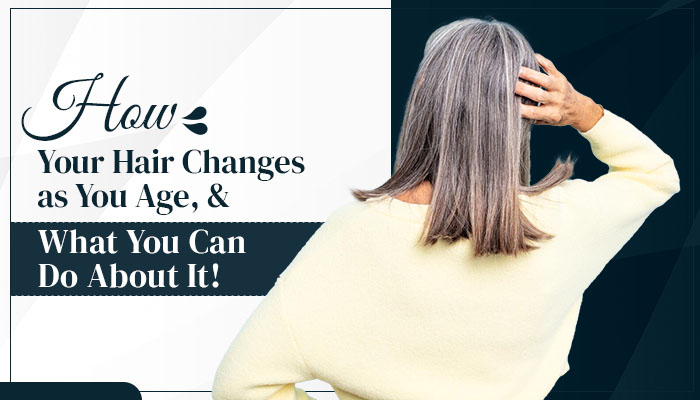Your Hair and Your Age
As we get older, it’s only natural for the texture and color of our hair to change. Our thick, bouncy locks might seem less lively, and hair types might change. And while there’s not much we can do to prevent the aging process, there are several ways to care for your evolving hair, including specific products and developing a routine for keeping your hair looking as good as ever.
If you’ve noticed that your hair isn’t quite what it once was, you might want to take note of the following! Below, we’ll dive into various methods for embracing your hair at any age!
How Aging Can Affect Your Hair
With age, our hair is likely to undergo several changes that can shock those who aren’t aware. Whether it starts with the appearance of gray hairs or the thinning of your follicles, these aspects can be incredibly troublesome for those that experience it. So, let’s take a closer look at how the aging process can cause changes in your hair’s feel and appearance.
1. Thinning Hair
One transformation your hair may undergo is thinning. Thick, youthful hair will often become dull and lifeless and can even begin to fall out. This may appear, at first, as simple thinning, but given enough time, you may experience patchiness or hair loss.
Dermatologists believe this occurs due to changing hair growth cycles. There are periods where the shaft of the hair will thicken and extend, known as anagen phases. However, as we age, these cycles may change or become interrupted, causing hair density to decrease and, in some cases, hair production to cease altogether.
2. Hair Loss
Known as alopecia areata, hair loss due to aging is typically caused by changes to hormone levels. In most cases, it’s normal for an individual to lose between 50 to 100 hairs a day. But when your production cycles have deteriorated, replenishment of these strands does not occur.
Doctors attribute this condition to several causes, including heredity and stress. One such cause is stress. High-stress environments can raise cortisol levels, heavily contributing to hair loss.
3. Graying Hair
Melanin is the chemical that produces melanocyte cells that play an integral part in the overall color of your hair. As we age, these melanocytes dwindle in number, reducing the amount of melanin in your hair. The result of this is graying hair and changing strand textures.
The Science Behind Your Changing Hair
While preventing changes to your hair isn’t always possible, there are a number of ways to understand your hair better and slow the effects of aging. The first aspect is understanding what plays the largest role in the transformation of your hair.
Some factors include:
1. Inflammation
Inflammation of the scalp is a leading contributor to thinning hair and hair loss. And as we age, this inflammation can worsen, weakening the hair root and promoting hereditary hair loss.
2. Ultraviolet Light
Believe it or not, UV rays are not just harmful to skin cells. Ultraviolet light can make hair brittle, allowing it to break and fall out. Hair damaged by this light is also more likely to thin.
3. Smoking Cigarettes
In some corners, it’s believed that smoking can constrict your blood vessels and cardiovascular system. This effectively reduces the blood flow to your hair follicles, minimizing its effectiveness in reproducing damaged hair. It’s also noted that smoking can increase inflammation, alter enzyme levels that control tissue production, and more.
4. Genetic Factors
We can’t escape the fact that specific genetic components may affect your hair’s health as you age. Many individuals will carry the genes for male and female pattern baldness and may potentially lose up to 80% of hair by turning 80.
5. Oxidative Stress
Free radicals also play a part in your hair’s health. These molecules often react to other chemicals and cells in your body and can potentially cause damage if left unchecked. This condition, known as oxidative stress, can alter the DNA of your hair cells, leading to hair loss and impaired hair regeneration.

How to Overhaul Your Hair Regimen
While there are numerous factors of your hair’s health that are, unfortunately, unavoidable, there remain several ways to keep your hair in its best condition.
1. Prevent Exposure to UV Light
As mentioned earlier, UV light can not only cause various types of skin cancer, but it can damage your hair and the surrounding scalp, causing your hair to become brittle. As such, you’ll want to avoid UV exposure whenever possible. Even on cloudy winter days, you’ll need to keep your hair and skin covered whenever you are outdoors for extended periods.
2. Preventing Exposure to Wind
Did you know that repeated exposure to windy weather can damage your hair? Wind can toss hair about, allowing strands to become entangled. Once this occurs, brushing your hair can pull out strands and cause breakage.
3. Minimize Exposure to Chemicals in Hair Products
Many hair products contain chemicals that can harm your hair’s health. These chemicals can strip vital oils from your scalp and hair strands, leaving them dry and brittle.
4. Prevent Exposure to Chemicals in Hair Treatments
In addition to shampoos, numerous hair treatments, such as perms, flat ironing, and hot curling, can damage hair, resulting in flyaway strands and split ends.
5. Condition Properly
As we’ve mentioned, some shampoos contain chemicals that can strip moisture from your hair. As such, it’s always a good idea to replenish any lost moisture by adding conditioners to your hair routine.
Haircare Tips for Normal Hair Types
When it comes to caring for your hair, a number of simple things can add up to make a big difference. For example, you may want to:
1. Wash oily hair
If you’re the type that has naturally oily hair, a consistent wash routine will remove excess oils. However, you’ll want to avoid overdoing it, as the compounds in hair care products can strip your hair, leaving it dry and brittle.
2. Use conditioner
Conditioner is a great way to replenish and seal your hair’s natural moisture. Adding it to your routine can significantly improve your hair’s strength, texture, and luster.
3. Protect hair when swimming
The chemicals in pool water can bleach and dry out your hair, leading to deadened, split ends and discoloration.
Haircare Tips for Curly Hair
If you possess curly hair, you already know that maintaining it can be a challenge. But have no fear! Use these tips to keep your locks looking beautiful and lustrous!
1. Wash hair at least once a week
For curly hair, a thorough wash once a week should be sufficient to keep your hair clean and healthy. Overwashing can result in dried-out, tangled ends.
2. Avoid using heating products
If possible, you’ll want to refrain from using products that use heat to style your hair. For example, hair curlers, flat irons, and hot combs can dry and burn your hair, causing them to become dry, weak, and prone to breaking.
3. Hot oil treatments
Derived from plant-based materials such as coconuts, almonds, and olives, hot oil treatments work by sealing your hair’s cuticle, strengthening the strand, and preventing moisture from escaping.
4. Use hair relaxers with caution
Overuse of hair relaxers can significantly damage your hair and scalp. In severe cases, it can even cause hair loss.
5. Ensure braids, cornrows, and weaves aren’t too tight
Overtightened braids can severely damage your hair, causing broken strands, irritated follicles, and scalp inflammation.
Dealing with Hair Issues? Winston Salem Dermatology Can Help!
Winston Salem Dermatology is proud to offer a wide range of cosmetic and medical treatments for customers throughout North Carolina. Our trained and licensed professionals can help you diagnose and treat various skin and hair issues.
We have years of experience providing customers with state-of-the-art cosmetic products and procedures, ensuring that you always look and feel as good as possible.
So, if you’ve been dealing with changes to your hair’s texture, color, or luster, give us a call today at (336) 774-8636! We’ll be happy to help you identify your symptoms and formulate a personalized hair or skin treatment plan. From hair loss treatments to hair removal, better hair and skin are only a phone call away! Are you ready?


